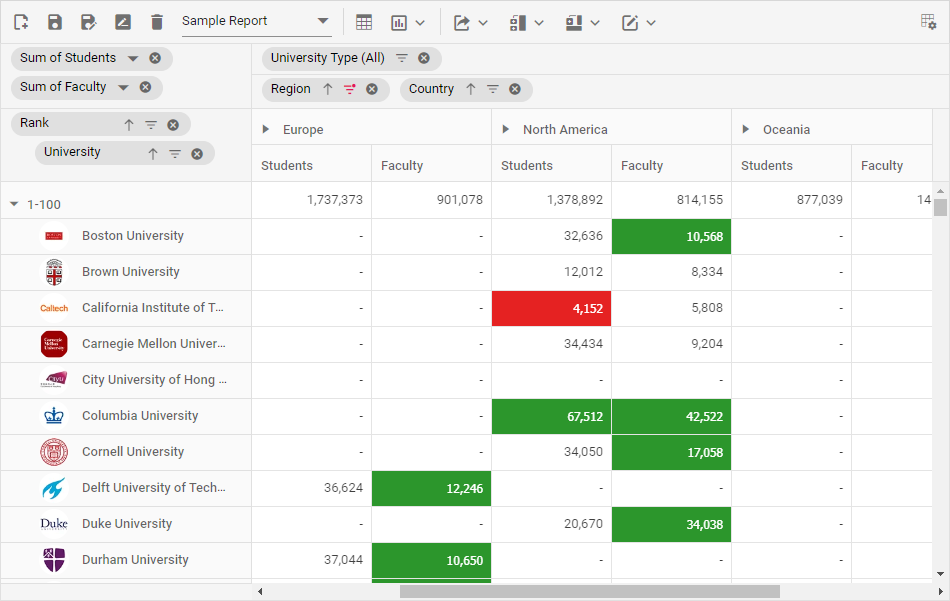
Security News
pnpm 10.0.0 Blocks Lifecycle Scripts by Default
pnpm 10 blocks lifecycle scripts by default to improve security, addressing supply chain attack risks but sparking debate over compatibility and workflow changes.
@syncfusion/ej2-react-pivotview
Advanced tools
The pivot grid, or pivot table, is used to visualize large sets of relational data in a cross-tabular format, similar to an Excel pivot table. for React
The React Pivot Table is a multi-dimensional data visualization component built on top of relational and OLAP data sources. The pivot report can be managed dynamically at runtime, along with other features such as graphical visualization (Pivot Chart), drill down/up, aggregation, filtering, sorting, grouping, conditional formatting, drill through, editing, hyperlink, and more. The large amounts of data are effectively handled by virtualization or paging support.
Getting started . Online demos . Learn more

Trusted by the world's leading companies

You can use create-react-app to setup applications. To create React app, use the following command.
npx create-react-app my-app --template typescript
cd my-app
npm start
All Syncfusion React packages are published in the npmjs.com registry. To install the React Pivot Table package, use the following command.
npm install @syncfusion/ej2-react-pivotview --save
Add CSS references needed for a Pivot Table in src/App.css from the ../node_modules/@syncfusion package folder.
@import '../node_modules/@syncfusion/ej2-base/styles/material.css';
@import '../node_modules/@syncfusion/ej2-buttons/styles/material.css';
@import '../node_modules/@syncfusion/ej2-dropdowns/styles/material.css';
@import '../node_modules/@syncfusion/ej2-grids/styles/material.css';
@import '../node_modules/@syncfusion/ej2-inputs/styles/material.css';
@import '../node_modules/@syncfusion/ej2-lists/styles/material.css';
@import '../node_modules/@syncfusion/ej2-navigations/styles/material.css';
@import '../node_modules/@syncfusion/ej2-popups/styles/material.css';
@import '../node_modules/@syncfusion/ej2-splitbuttons/styles/material.css';
@import '../node_modules/@syncfusion/ej2-calendars/styles/material.css';
@import '../node_modules/@syncfusion/ej2-react-pivotview/styles/material.css';
In the src/App.tsx file, use the following code snippet to render the Syncfusion React Pivot Table component and import App.css to apply styles to the Pivot Table.
import { IDataSet, IDataOptions, PivotViewComponent } from '@syncfusion/ej2-react-pivotview';
import * as React from 'react';
import './App.css';
export default function App() {
let pivotData: IDataSet[] = [
{ 'Sold': 31, 'Amount': 52824, 'Country': 'France', 'Products': 'Mountain Bikes', 'Year': 'FY 2015', 'Quarter': 'Q1' },
{ 'Sold': 51, 'Amount': 86904, 'Country': 'France', 'Products': 'Mountain Bikes', 'Year': 'FY 2015', 'Quarter': 'Q2' },
{ 'Sold': 90, 'Amount': 153360, 'Country': 'France', 'Products': 'Mountain Bikes', 'Year': 'FY 2015', 'Quarter': 'Q3' },
{ 'Sold': 25, 'Amount': 42600, 'Country': 'France', 'Products': 'Mountain Bikes', 'Year': 'FY 2015', 'Quarter': 'Q4' },
{ 'Sold': 27, 'Amount': 46008, 'Country': 'France', 'Products': 'Mountain Bikes', 'Year': 'FY 2016', 'Quarter': 'Q1' }
];
let dataSourceSettings: IDataOptions = {
columns: [{ name: 'Year', caption: 'Production Year' }, { name: 'Quarter' }],
dataSource: pivotData,
expandAll: false,
filters: [],
formatSettings: [{ name: 'Amount', format: 'C0' }],
rows: [{ name: 'Country' }, { name: 'Products' }],
values: [{ name: 'Sold', caption: 'Units Sold' }, { name: 'Amount', caption: 'Sold Amount' }]
};
return <PivotViewComponent id='PivotView' height={350} dataSourceSettings={this.dataSourceSettings}></PivotViewComponent>
}
Pivot Table component is also offered in the following list of frameworks.
 JavaScript |  Angular |  Vue |  ASP.NET Core |  ASP.NET MVC |
|---|
Product support is available through the following mediums.
Check the changelog here. Get minor improvements and bug fixes every week to stay up to date with frequent updates.
This is a commercial product and requires a paid license for possession or use. Syncfusion’s licensed software, including this component, is subject to the terms and conditions of Syncfusion's EULA. To acquire a license for 80+ React UI components, you can purchase or start a free 30-day trial.
A free community license is also available for companies and individuals whose organizations have less than $1 million USD in annual gross revenue and five or fewer developers.
See LICENSE FILE for more info.
© Copyright 2023 Syncfusion, Inc. All Rights Reserved. The Syncfusion Essential Studio license and copyright applies to this distribution.
FAQs
The pivot grid, or pivot table, is used to visualize large sets of relational data in a cross-tabular format, similar to an Excel pivot table. for React
The npm package @syncfusion/ej2-react-pivotview receives a total of 1,324 weekly downloads. As such, @syncfusion/ej2-react-pivotview popularity was classified as popular.
We found that @syncfusion/ej2-react-pivotview demonstrated a healthy version release cadence and project activity because the last version was released less than a year ago. It has 0 open source maintainers collaborating on the project.
Did you know?

Socket for GitHub automatically highlights issues in each pull request and monitors the health of all your open source dependencies. Discover the contents of your packages and block harmful activity before you install or update your dependencies.

Security News
pnpm 10 blocks lifecycle scripts by default to improve security, addressing supply chain attack risks but sparking debate over compatibility and workflow changes.

Product
Socket now supports uv.lock files to ensure consistent, secure dependency resolution for Python projects and enhance supply chain security.

Research
Security News
Socket researchers have discovered multiple malicious npm packages targeting Solana private keys, abusing Gmail to exfiltrate the data and drain Solana wallets.